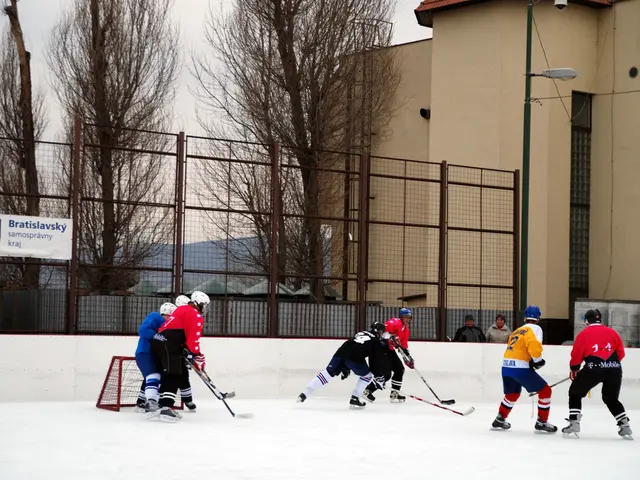Banning Soviet Flags at World War II Memorials in Berlin: A Justified Response to Current Geopolitical Tensions
Enquiry into the Justification of Prohibiting Red Banners during World War II Remembrances at Berlin's Memorial - Restriction of Soviet Flags at World War II Memorial in Berlin
In the heart of Berlin, the bustling city that once served as the epicenter of the Second World War, a new order has been put in place. Over the past few days, around various memorials, the display of Soviet Union flags has been prohibited.
This police order, issued on Thursday and Friday, targets flags associated with Russia. A court recently dismissed an application from an unnamed association planning a memorial event, deeming the prohibition justified to preserve public peace and facilitate a respectful observance of memorial days.
On the 8th of May, 1945, the war started by Germany ended, marking the end of the Nazi dictatorship. Commemorating this pivotal day, 80 years later, comes this week with numerous events, including a ceremony in the Bundestag.
Treptow district, once a part of East Berlin, houses a central memorial dedicated to the soldiers of the Red Army of the Soviet Union who fought against Nazi Germany. The Soviet Union dissolved in 1991, splitting into Russia and other successor states such as Ukraine. References to the Soviet era have taken on significant importance in current Russian propaganda, under the leadership of President Vladimir Putin.
Under the current political climate, Soviet Union flags may be perceived, at the very least, as a sign of support for Russia's present-day military endeavors. Even small displays of these flags could give the impression of a "victory march," with an intimidating and militantly suggestive effect that might undermine the dignity of the victims and risk disturbing public peace.
In light of the ongoing Russian aggression in Ukraine, authorities have imposed a blanket ban on Russian and Soviet symbols during commemoration events, including the 80th anniversary of the end of World War II, to prevent such symbols from fueling conflicts or divisiveness during peaceful remembrances.
- Memorial
- Flag
- USSR
- World War II commemoration
- Second World War
- Berlin
- Police
- Anniversary
- Russia
- Treptow
- Ukraine
In this context, the ban on Soviet flags is more than just a restriction on symbols; it serves as a reminder of the need for respectful, peaceful commemoration amid ongoing geopolitical tensions. The authorities' primary goal is to strike a delicate balance between honoring historical memory and addressing present-day realities.
- The police in Berlin have prohibited the display of Soviet Union flags around various World War II memorials, aiming to maintain public peace and ensure a respectful observance of the anniversary.
- On the same anniversary week, officials in Treptow district, where a central memorial for the Red Army of the Soviet Union is located, have restricted the public display of USSR flags.
- As the 80th anniversary of the end of World War II approaches, authorities have imposed a ban on Russian and Soviet symbols during commemoration events due to ongoing geopolitical tensions, particularly in Ukraine.
- Despite the Soviet Union's dissolution in 1991, references to the era have become significant in current Russian propaganda, under President Vladimir Putin's leadership.
- By banning Soviet flags and symbols during World War II commemorations, the authorities in Berlin hope to prevent these symbols from being used as a political statement or fueling conflicts, thus upholding the dignity of the victims and maintaining a peaceful remembrance of the past.








